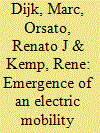| Srl | Item |
| 1 |
ID:
117231


|
|
|
|
|
| Publication |
2013.
|
| Summary/Abstract |
In this paper, we analyse the emergence of a trajectory of electric moblity. We describe developments in electric vehicles before and after 2005. The central thesis of the paper is that electric mobility has crossed a critical threshold and is benefitting from various developments whose influence can be expected to grow in importance: high oil prices, carbon constraints, and rise of organised car sharing and intermodality. We find that the development of vehicle engine technology depends on changes in (fueling) infrastructure, changes in mobility, changes in the global car market, evolution of energy prices, climate policy, and changes in the electricity sector. Special attention is given to interaction of technological alternatives: how these work out for the future of battery electric vehicles, hybrid electric vehicles and hydrogen fuel cell vehicles.
|
|
|
|
|
|
|
|
|
|
|
|
|
|
|
|
| 2 |
ID:
169881


|
|
|
|
|
| Summary/Abstract |
The UK energy sector has been one of large-scale centralised energy production by big companies, with households seen as passive consumers of energy at the end of wires. The development of renewable energy technologies, such as solar photovoltaics (PV), signals greater potential for small-scale energy production. Such change provides the opportunity for households and communities to become active consumers and producers of energy, as well as for energy service providers to support integration of renewable technologies. Drawing on data from a community energy study, the paper shows how community energy projects can be test beds for developing new business models, leading to empowerment and democratisation as important stepping stones to mainstream community energy. The paper adds to existing knowledge about these challenges by developing possible future pathways to mainstream community energy: top-down; bottom-up; and hybrid. These pathways’ potential contribution to decarbonising the energy sector is considered, with implications for policy, regulation and new business models.
|
|
|
|
|
|
|
|
|
|
|
|
|
|
|
|